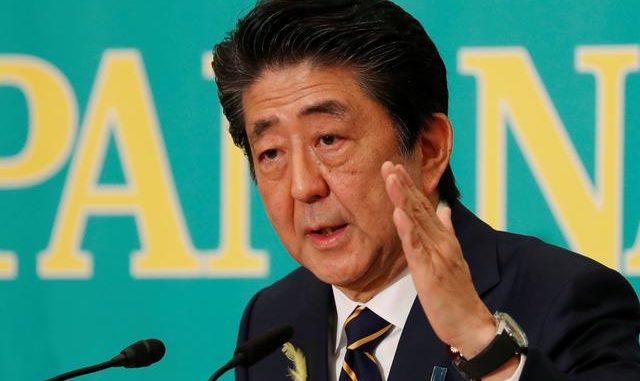
Japanese Prime Minister Shinzo Abe will likely pick a former Olympic speed skater to prepare for the 2020 Games and keep allies in key posts in a cabinet reshuffle on Wednesday as he readies a tax rise and aims to revise the pacifist constitution.FILE PHOTO: Japan’s Prime Minister Shinzo Abe, who is also ruling Liberal Democratic Party leader, speaks at a debate session ahead of July 21 upper house election at the Japan National Press Club in Tokyo, Japan July 3, 2019. REUTERS/Issei Kato
Speculation has swirled that Abe, poised to become Japan’s longest-serving premier in November, will hand a post to Shinjiro Koizumi, 38, the popular son of an ex-prime minister whom surveys show voters favor as the next leader, but expectations have waned recently.
Abe is set to retain Finance Minister Taro Aso, 78, and Chief Cabinet Secretary Yoshihide Suga, 70, both of whom have served in their positions since the conservative leader returned to office in 2012, promising to reboot the economy and bolster the military, political sources and media said.
Aso must help ensure the economy weathers an October increase in the sales tax to 10% from 8% that could dampen consumption when a U.S.-China trade war is clouding growth.
RELATED COVERAGE
- Ex-Japan PM Koizumi’s son to be picked for Abe cabinet post
- Japan’s Abe to pick former vice minister Sugawara as trade minister: NHK
Abe is also poised to keep veteran lawmaker Toshihiro Nikai, 80, as Liberal Democratic Party (LDP) secretary general, the party’s number two post, political sources and media said.
Economy Minister Toshimitsu Motegi, 63, a Harvard-educated lawmaker with a reputation as a tough negotiator, will take over at the foreign ministry from Taro Kono.
But Motegi will probably stay in charge of trade talks with the United States ahead of a deadline for a deal later this month, media reported.
Kono, a fluent English speaker who is well-known in Washington and has been on the front line of Japan’s feud with South Korea over wartime history and trade, is in line to become defense minister, media reported.
Kono, 56, who has a reputation as a maverick and is sometimes mentioned as a possible successor to Abe, would replace Takeshi Iwaya, who upset some ruling LDP colleagues in June by smiling when he met his South Korean counterpart.
“Abe’s keeping control and it’s his people running the show,” said Jesper Koll, senior advisor at asset manager WisdomTree Japan.
“He’s the anti-Trump – it’s a bastion of stability compared to the ‘draining of the swamp’ in America and gridlock in Europe.”
Seiko Hashimoto, a seven-time woman Olympian who competed in both speed skating and cycling, is expected to become Olympics minister to oversee Japan’s hosting of the 2020 Summer Games, media said, making her one of two women expected to gain posts.
Abe, whose third consecutive term as LDP president ends in September 2021, has made clear he intends to pursue his goal of revising the post-war, U.S.-drafted constitution to clarify the status of the military.
The charter, if taken literally, bans a standing military but has been stretched to allow armed forces for self-defense.
Abe’s task got tougher when his LDP-led coalition lost its two-thirds majority in a July upper house election. Amendments to the charter require approval by two-thirds of each chamber of parliament and a majority in a referendum.
Voter support for Abe was at 48% in a survey this month by public broadcaster NHK, little changed from August.
Social security topped the list of issues voters want the new cabinet to tackle, followed by the economy. Only 5% mentioned constitutional reform as a priority.
Reporting by Linda Sieg; Editing by Robert Birsel
TOKYO (Reuters) –
